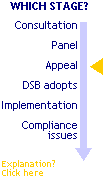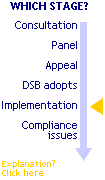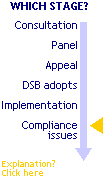WTO: 2005 NEWS ITEMS
Dispute Settlement Body 25 January 2005
US and Canada block first EC panel requests in new ‘hormones’ dispute
Four first-time requests for a dispute panel to be set up were blocked on 25 January 2005, including the European Communities’ requests to consider the United States’ and Canada’s continued sanctions against the EC’s import ban on hormone-treated beef.
While respondents may block a first panel request, a panel is automatically established at the second request.
SEE ALSO:
> press
releases
> news
archives
> Supachai
Panitchpakdi's speeches
> Disputes in the WTO
> Find disputes cases
> Find disputes documents
> Disputes chronologically
> Disputes by subject
> Disputes by country
NOTE:
This summary has been prepared by the WTO Secretariat’s Information and
Media Relations Division to help public understanding about developments
in WTO disputes. It is not a legal interpretation of the issues, and it is
not intended as a complete account of the issues. These can be found in
the reports themselves and in the minutes of the Dispute Settlement
Body’s meetings.
Request for panel
 These are cases that have completed the
consultation phase, the first stage of a dispute. When consultations have
failed, member governments are entitled to ask for a panel to be set up to
examine the dispute. According to the rules, the respondent can reject the
first request. At the second request, a panel is automatically
established.
These are cases that have completed the
consultation phase, the first stage of a dispute. When consultations have
failed, member governments are entitled to ask for a panel to be set up to
examine the dispute. According to the rules, the respondent can reject the
first request. At the second request, a panel is automatically
established.
DS315: European Communities — Selected customs matters
In its request for a panel, the US highlighted two issues: the US view that the EC was failing to administer its customs laws in a uniform, impartial, and reasonable manner; and the EC’s alleged failure to maintain a forum for the prompt review and correction of administrative action relating to customs matters. The US said that it had discussed these issues in detail with the EC during consultations in November 2004 and that since consultation had not yielded a resolution, the US had to ask for a dispute settlement panel to be set up.
The EC commented that the exact nature of the US concerns remained unclear. The EC acknowledged that it did not have a single centralised customs administration and that it was the member states’ authorities and tribunals who reviewed customs decisions and not EC institutions. However, the EC pointed out that these questions were about the distribution of competences within the internal legal order of a WTO member and went well beyond what was required by WTO rules.
The EC therefore blocked the establishment of a panel.
DS320: United States — Continued suspension of obligations in the EC —
Hormones dispute
The EC explained that the dispute was about the retaliatory tariffs that the US continued to impose on imports from the EC. It was also about the US’s unilateral determination that the EC had not complied with the WTO dispute ruling, and the fact that the US had not asked for a panel to examine the EC’s compliance, the EC added.
The EC recalled that in October 2003, it had informed the DSB that it was complying with the ruling in the “EC — Hormones” dispute. By adopting a new Hormones Directive which was preceded by a thorough and independent scientific risk assessment, it had removed the measure found to be inconsistent with the WTO Agreement, the EC said.
The EC pointed out that by continuing to impose sanctions after the EC had corrected its measure so as to comply with the ruling, the US was violating the Dispute Settlement Understanding (DSU). In addition, by charging tariffs that were higher than the US’ bound rates, without continued authorization from the DSB, the US was also violating the General Agreement on Tariffs and Trade (GATT) Articles I (Most-Favoured-Nation Treatment) and II (Schedule of Concessions), the EC said.
The EC asked for a panel to be set up.
The US said that it was still reviewing the studies and documents the EC had cited. But so far the US failed to see how the revised EC measure could be considered to implement the DSB’s rulings.
The US also challenged the EC’s interpretation of the dispute settlement rules that by unilaterally declaring it was complying, the EC had somehow invalidated the DSB’s authorization for the US to impose sanctions in this dispute. The US said that its actions under the DSB’s authorization were entirely consistent with its WTO obligations.
The US blocked the establishment of a panel at this meeting.
DS321: Canada — Continued suspension of obligations in the EC — Hormones
dispute
The EC said that, like the US, Canada had refused to ask for a compliance panel to review the EC’s implementation of the DSB’s rulings and had also refused to accept the EC’s offer of a mutually agreed procedure in the WTO to resolve the disagreement. The EC observed that Canada continued to maintain sanctions against imports from the EC.
The EC asked for a panel to be established.
Canada said that it had acted under
authorization from the DSB, justified by the EC’s failure to comply within
a reasonable period of time.
Canada said that, although the EC now asserted that it was complying, it
had neither sought nor received a multilateral determination (i.e. a WTO
ruling) that this was the case.
Canada added that it was happy to discuss the case further with the EC. However, the EC could not unilaterally claim that it had complied with the DSB’s rulings and nor could it say that Canada’s authorization to apply sanctions granted to it by the DSB was therefore invalid, Canada said.
Canada opposed the EC’s request for a panel.
back to top
Appeal
 Within 60 days of a panel report's
publication, the DSB must adopt it unless it is appealed, in which case
the matter is referred to the Appellate Body.
Within 60 days of a panel report's
publication, the DSB must adopt it unless it is appealed, in which case
the matter is referred to the Appellate Body.
DS302: Dominican Republic — Measures affecting the import and internal
sale of cigarettes
The Dominican Republic notified the DSB before the meeting of its decision to appeal the panel report in the case “Dominican Republic — Measures affecting the importation and internal sale of cigarettes” and therefore the agenda item on the adoption of this panel report was removed.
back to top
Implementation
 After a ruling has been adopted,
the DSB keeps under surveillance the implementation of the ruling until
the issue is resolved.
After a ruling has been adopted,
the DSB keeps under surveillance the implementation of the ruling until
the issue is resolved.
DS277: United States — Investigation of the International Trade Commission
in softwood lumber from Canada
This item was placed on the agenda at the US' request because the implementation period expired on 26 January 2005.
The United States declared that it had implemented the DSB’s rulings in the “Investigation of the International Trade Commission in softwood lumber from Canada” case. The US said that its International Trade Commission had reopened its investigation and determined that a US industry was threatened with material injury. As a result, the US added, in December 2004 the US antidumping and countervailing duty orders on softwood lumber from Canada had been amended.
Canada noted as a positive sign the fact that the US announced its implementation ahead of schedule. Canada said that it was reviewing the results of the US implementation and that it would in due course tell the DSB how it would respond.
Other implementation cases
There are no new developments to report since the last DSB meeting on the following items:
DS176: US — Section 211 Omnibus
Appropriations Act of 1998
DS184: US — Anti-dumping measures on certain hot-rolled steel products
from Japan
DS217
&
DS234: US — Continued Dumping and Subsidy Offset Act of 2000 (Byrd
Amendment)
DS160: United States — Section 110(5) of the US Copyright Act.
DS204: Mexico — Measures affecting telecommunications services.
back to top
Request for compliance panel
 At the end of the period given to a
government to comply with a ruling, the parties to the dispute sometimes
disagree on whether that government is really complying. Any member
government involved in the dispute can ask for the original panel to
decide whether the ruling has been applied properly.
At the end of the period given to a
government to comply with a ruling, the parties to the dispute sometimes
disagree on whether that government is really complying. Any member
government involved in the dispute can ask for the original panel to
decide whether the ruling has been applied properly.
DS108: United States — Tax treatment for “foreign sales corporations”
The EC acknowledged that the repeal of the US Foreign Sales Corporation scheme represented a major step towards solving the dispute. The EC pointed out that the repeal act included transitional provisions and other provisions that extended the tax breaks for some of the companies who were already enjoying them (“grandfathering”). The EC said that these provisions appeared to be incompatible with WTO agreements.
The EC therefore asked for a panel to be set up under DSU Article 21.5 [link to the article] to rule on whether the US was now complying with the DSB’s rulings.
The US said that the American Jobs
Creation Act of 2004, which repealed the FSC tax exclusion, was the most
significant piece of US tax legislation in 20 years and therefore included
transition rules. Transition rules were a common feature of tax
legislation and the EC had not identified any particular commercial
problem caused by them, the US added.
The US did not accept the establishment of a panel.
back to top
Notification of understanding
 DS217: United States — Continued
Dumping and Subsidy Offset Act of 2000 (Byrd Amendment)
DS217: United States — Continued
Dumping and Subsidy Offset Act of 2000 (Byrd Amendment)
Before the DSB meeting, Australia, Thailand, Indonesia and the US reached an understanding in the Byrd Amendment case recognizing that US still has not complied with the rulings of the DSB and that the three complainants are entitled to request authorization from the DSB to apply sanctions against the US. The understanding says that Australia, Thailand and Indonesia do not currently wish to seek authorization but keep the right to do so at any time unless (i) there is a consensus in the DSB against granting the authorization or (ii) the US objects to the level of sanctions.
At this meeting, the four countries asked the DSB to take note of and agree to the understanding they had reached. The DSB did so.
back to top
Next meeting
The next regular DSB meeting will be on 17 February 2005.
> help
You can perform more sophisticated searches from the Documents Online search facility (opens in new window) by defining multiple search criteria such as document code WT/DSxxx (where “xxx” is the case number), full text search or document date.
